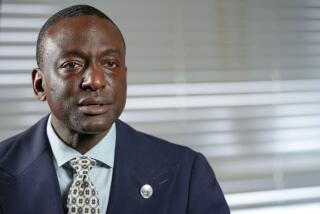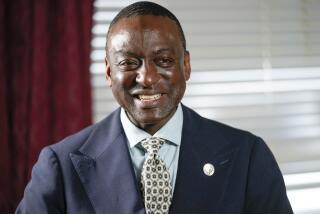Clinton Needs Giuliani’s Help in Harlem
- Share via
NEW YORK — As a shaft of early morning sunlight rippled across 125th Street in Harlem on Tuesday, the nation’s most famous black neighborhood woke up to a new reality: Bill Clinton, former president and the recipient of massive political support from the black community, wants to move in.
But however much Clinton wants to make Harlem his home, Mayor Rudolph W. Giuliani holds the keys. Even as the former president took a welcoming stroll Tuesday through the area, reports surfaced that the lease he wants to sign for 7,000 square feet on 125th Street is held by the city’s child welfare agency. And it’s not clear when--or if--the agreement will be broken.
“We own this lease, and while I think it would be a good thing for the president to have office space in Harlem, the landlord has to make us, the city, an offer,” said Giuliani at a news conference. “I don’t want to stand in the way, but we have rights. It’s the kind of thing that will probably take a few days to work out. This is business, not personal.”
For Clinton and members of the Harlem community, though, much of the to-do about his moving into the neighborhood seems deeply personal. And few seemed to worry that the child welfare agency lease would prevent the ex-president from opening offices a stone’s throw from the Apollo Theatre.
“I’ve decided to locate my office in this building, if we can work it out,” he said, as hundreds of Harlem residents cheered him outside the shiny new edifice on West 125th Street. “For me, this is like a homecoming, and it feels like the right thing to do.”
Given Clinton’s tumultuous post-presidency, movin’ on up to a $210,000 Harlem office lease might dampen criticism of his prior decision--now abandoned--to rent an $810,000 suite overlooking Central Park in midtown Manhattan. Indeed, Clinton’s supporters hope the goodwill he is experiencing in Harlem might give him a break from the bad publicity he has received over the pardon of financier Marc Rich, and the gifts he and his wife returned to the government, saying they mistakenly thought they were given for their personal use.
When the former president emerged from the office building to make a statement, welcoming chants broke out in the crowd and cars honked in support as they crawled by. Mothers held up small children to see Clinton.
Watching him speak, Nicola Jackson shouted: “I’m going to kiss him! I’m going to kiss the president!” Her more skeptical friend, Fanta Kon, laughed: “That’s right, girl. And then you catch hell from Hillary.”
“We love the man here,” said Harry Davis, who works at a substance abuse clinic. “It would be a great thing for him personally to work in the neighborhood, because for once he’d be surrounded by real supporters.”
But the Harlem deal could also pay dividends for a neighborhood that is booming economically and culturally after years of neglect. In recent years, massive corporate investment has changed the face of 125th Street, bringing in retail giants such as HMV records, Old Navy, Starbucks, Rite-Aid Pharmacies, Magic Johnson Cinemas and other outlets. Harlem still has dozens of independent shops such as Nefertiti’s Fashion, the Harlem Fish Hut and Uptown Flava Men’s Sportswear, yet many are struggling as commercial rents increase.
Many community leaders hope that Clinton’s presence will focus renewed attention on these shopkeepers and their needs as corporate investment continues. Indeed, the Rev. Al Sharpton said he hopes the former president will bring more than a rent check to the neighborhood because “we have to make sure everybody participates in our economic growth. We want the growth in Harlem to benefit all the people who live here.”
Clinton seemed to make that a priority in describing his reasons for seeking out office space in the historic black community. He noted that the first so-called empowerment zone created by his administration in 1993 to spur growth--with healthy outside investment--in poor areas was in Harlem.
“I feel, because of the empowerment zone, that this is what my presidency was all about, and what my actions after the presidency will be about,” the former president said. “We want to bring economic opportunity to places that don’t have it.”
As residents applauded, Clinton also noted that he used to walk the length of 125th Street in the 1960s, when he flew into New York after returning from his academic studies at Oxford. “People would often ask me what I was doing here, and I just told them that I liked it,” he said. After speaking to the crowd, Clinton signed autographs on his walk through the community and wound up having lunch at a popular Cajun restaurant.
“With Clinton here, I think there will be a lot more media attention paid to Harlem and its needs,” said Marilyn Nieves, a computer student in a school housed in the new office building. “It’s a miracle for us.”
By Clinton’s own admission, however, the story of how he came to Harlem shows the immense clout that Rep. Charles B. Rangel, the dean of local politicians, has gained with the former president. Rangel, said Clinton, strongly urged him to consider 125th Street when congressional criticism of the proposed midtown penthouse lease reached a crescendo last weekend.
Earlier, the New York Democrat was a forceful voice opposing Clinton’s impeachment, and he played a key role in persuading Hillary Rodham Clinton to run for the U.S. Senate. Appearing on a local TV news show Monday, Rangel tried to play down his role in the Clinton lease, but he couldn’t stop beaming.
“It’s a great day in Harlem,” he said. “He’ll fit right in.”
More to Read
Sign up for Essential California
The most important California stories and recommendations in your inbox every morning.
You may occasionally receive promotional content from the Los Angeles Times.













